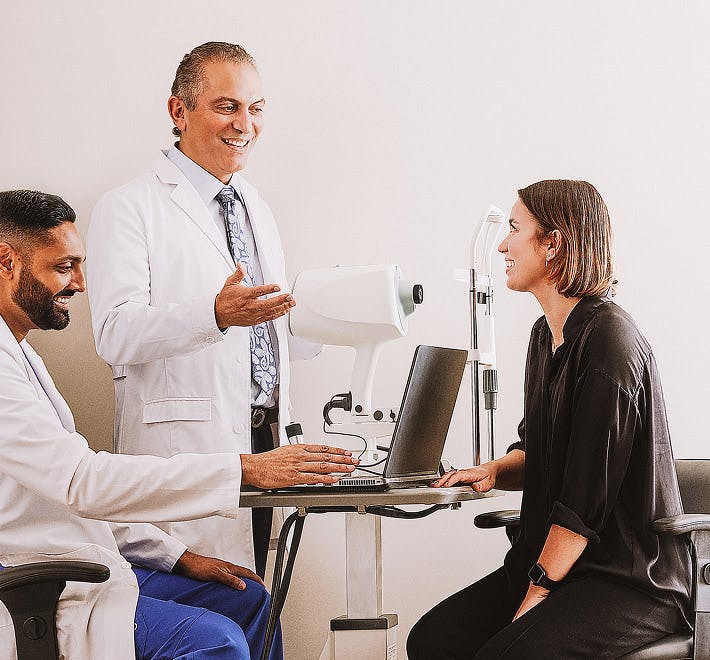Enhancing Your Vision
Guiding you toward the procedure that fits your unique needs, so you can see the world clearly and confidently.

LASIK, or laser-assisted in situ keratomileusis, is a popular refractive surgery to correct vision problems such as nearsightedness, farsightedness, and astigmatism. During the procedure, one of our surgeons reshapes the cornea using a laser, allowing light to focus properly on the retina, resulting in clearer vision. With over 80,000 successful vision correction surgeries under my belt, I can attest to the life-changing results LASIK can provide.
While LASIK offers remarkable immediate results, it’s essential to recognize that achieving optimal vision is not instantaneous. Patients often experience temporary side effects (including blurry vision) as part of the healing process, and vision can take up to 4-6 weeks to fully stabilize. Awareness of these changes can alleviate concerns and help you confidently navigate recovery.
The duration of blurry vision after LASIK can vary depending on several factors, including dryness, swelling, and individual healing capabilities. Rarely, complications can prolong recovery. Working closely with our care team is vital for a smoother healing process and optimal results.
Many patients will see reasonably clear immediately after LASIK and can read the clock on the wall as soon as they get up from the surgical bed. However, at this stage, vision is still somewhat blurry and may fluctuate wildly before stabilizing.
Common symptoms of healing include:
These symptoms typically subside within the first few hours to days post-surgery as your eyes begin to heal. Most patients see 20/20 the next morning after the surgery. This may fluctuate somewhat over the next few days until it stabilizes.
Temporary blurry vision can be attributed to factors such as corneal swelling and tear production fluctuations. While this can be disconcerting, it typically resolves within the first few days to weeks following surgery.
Patience is key during the immediate post-surgery period. Understanding that blurry vision is a normal part of the healing process can help manage expectations and alleviate anxiety. Most patients experience significant improvement in vision clarity within the first day following surgery.
The timeline for vision improvement after LASIK varies from person to person. While some individuals may experience rapid recovery, others may require more time for their vision to stabilize.
Several factors influence recovery speed, including the extent of the prescription corrected, individual healing capacity, and adherence to post-operative care instructions.
Signs of Healing: From Blurry to Clear Vision
As your eyes heal, you’ll notice a gradual improvement in vision clarity. Blurry vision will gradually diminish, giving way to sharper, more focused vision over time.
The timeframe for achieving clear vision after LASIK varies, with most patients experiencing significant improvement within the first few hours to weeks following surgery. However, full stabilization may take several weeks to months.
While blurry vision is normal after LASIK, steps can be taken to minimize discomfort and promote healing. These include using prescribed and recommended eye drops, avoiding strenuous activities, and getting adequate rest. Your surgeon will provide you with clearly outlined post-operative instructions to ensure a successful and timely recovery.
It is essential to recognize that recovery from LASIK surgery is individualized. Factors such as age, health, and the severity of the refractive error can impact the speed and extent of vision improvement.
Assessing long-term vision stability following your procedure involves monitoring visual acuity and any changes in prescription over time. While LASIK offers long-term vision correction for many patients, regular follow-up appointments are necessary to monitor vision stability and address potential complications.
Follow-up appointments allow your eye care provider to assess progress, address concerns, and ensure optimal outcomes. These appointments are essential to post-LASIK care and should not be overlooked.
While complications after LASIK are rare, it’s essential to be aware of potential signs of trouble, such as blurry vision that does not improve, eye pain, or sudden vision changes. If you experience any of these symptoms, contact our care team immediately.
To minimize blurriness after LASIK surgery, make sure to adhere to your surgeon’s instructions regarding using prescribed eye drops and protective eyewear. Additionally, avoid rubbing or touching your eyes and refrain from strenuous activities during the initial healing period.
Maintaining good eye health is essential for a smooth recovery after LASIK. This includes staying hydrated, eating a balanced diet rich in vitamins and minerals, and getting regular eye exams.
Lifestyle adjustments can also support recovery after LASIK. These may include getting adequate sleep, practicing stress-reducing techniques, getting regular exercise, and avoiding activities that could put undue strain on the eyes.
Contrary to popular belief, you will not be required to wear sunglasses that completely obscure vision when you leave the surgery center. You will still be able to see fairly well, if not slightly better, immediately following surgery. However, it is normal to experience some degree of blurry vision.
Recovery from LASIK surgery is a gradual process, and it’s essential to have realistic expectations. While some patients may achieve clear vision quickly, others may require more time for their eyes to heal and stabilize fully.
Persistent blurry vision after LASIK can be concerning, but it is essential to remain patient and diligently follow post-operative care instructions. If blurry vision persists or worsens over time, consult your eye care provider for further evaluation.
Guiding you toward the procedure that fits your unique needs, so you can see the world clearly and confidently.




If you do not see your preferred date and time please call the office, so we can accommodate your request (917) 398-4011.